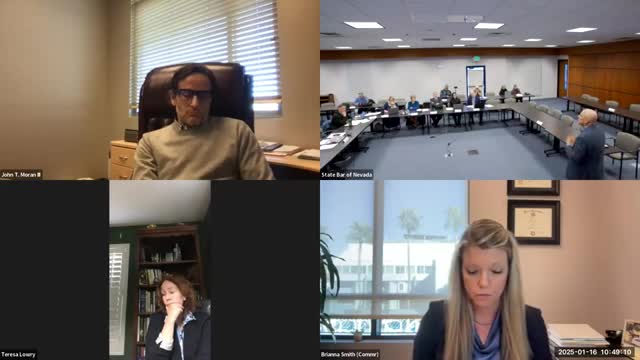Commission Vacates Deferral Agreement for Reece After Compliance Violation
July 06, 2025 | Commission on Ethics, Independent Boards, Commissions, or Councils, Organizations, Executive, Nevada
This article was created by AI summarizing key points discussed. AI makes mistakes, so for full details and context, please refer to the video of the full meeting. Please report any errors so we can fix them. Report an error »

The Nevada Commission on Ethics convened on January 16, 2025, to address several pressing matters, including the status of pending cases and the implementation of language access plans. The meeting highlighted the commission's ongoing efforts to ensure compliance with ethical standards and improve accessibility for diverse communities.
Executive Director Armstrong provided an update on the timeline for pending cases, noting that two complex cases are expected to be ready for review in the first half of the year. The commission has waived the usual 60-day time limit for these cases, indicating the intricate nature of the issues involved. Armstrong emphasized the importance of establishing clear boundaries regarding deferral agreements, stating that a violation occurs only when a review panel finds insufficient cause to proceed after a thorough investigation. This approach aims to maintain an educational focus while ensuring accountability.
In a significant decision, the commission unanimously voted to vacate a deferral agreement concerning an individual named Reece, citing a failure to comply with its terms. This action underscores the commission's commitment to enforcing ethical standards and ensuring that consequences follow violations of agreements designed to promote compliance.
The meeting also addressed the commission's language access plans, mandated by NRS 232.0081. Armstrong explained that the plan aims to enhance access to government services for non-English speakers, particularly in light of challenges posed during the pandemic. The commission is working to identify the demographics of the populations it serves and improve language services, including the translation of vital forms and the ethics manual into the most commonly spoken languages in the state.
Public comments during the meeting raised concerns about the commission's outreach to the deaf and hard of hearing communities. Armstrong acknowledged the need for better collaboration with existing state resources and committed to exploring partnerships to enhance language access services.
Overall, the January 16 meeting of the Nevada Commission on Ethics highlighted critical discussions around compliance, accountability, and accessibility. As the commission moves forward, it will continue to refine its processes and ensure that all community members have equitable access to its services. The next steps will involve further proceedings on the vacated deferral agreement and ongoing development of the language access plan, with an emphasis on inclusivity and responsiveness to community needs.
Executive Director Armstrong provided an update on the timeline for pending cases, noting that two complex cases are expected to be ready for review in the first half of the year. The commission has waived the usual 60-day time limit for these cases, indicating the intricate nature of the issues involved. Armstrong emphasized the importance of establishing clear boundaries regarding deferral agreements, stating that a violation occurs only when a review panel finds insufficient cause to proceed after a thorough investigation. This approach aims to maintain an educational focus while ensuring accountability.
In a significant decision, the commission unanimously voted to vacate a deferral agreement concerning an individual named Reece, citing a failure to comply with its terms. This action underscores the commission's commitment to enforcing ethical standards and ensuring that consequences follow violations of agreements designed to promote compliance.
The meeting also addressed the commission's language access plans, mandated by NRS 232.0081. Armstrong explained that the plan aims to enhance access to government services for non-English speakers, particularly in light of challenges posed during the pandemic. The commission is working to identify the demographics of the populations it serves and improve language services, including the translation of vital forms and the ethics manual into the most commonly spoken languages in the state.
Public comments during the meeting raised concerns about the commission's outreach to the deaf and hard of hearing communities. Armstrong acknowledged the need for better collaboration with existing state resources and committed to exploring partnerships to enhance language access services.
Overall, the January 16 meeting of the Nevada Commission on Ethics highlighted critical discussions around compliance, accountability, and accessibility. As the commission moves forward, it will continue to refine its processes and ensure that all community members have equitable access to its services. The next steps will involve further proceedings on the vacated deferral agreement and ongoing development of the language access plan, with an emphasis on inclusivity and responsiveness to community needs.
View full meeting
This article is based on a recent meeting—watch the full video and explore the complete transcript for deeper insights into the discussion.
View full meeting